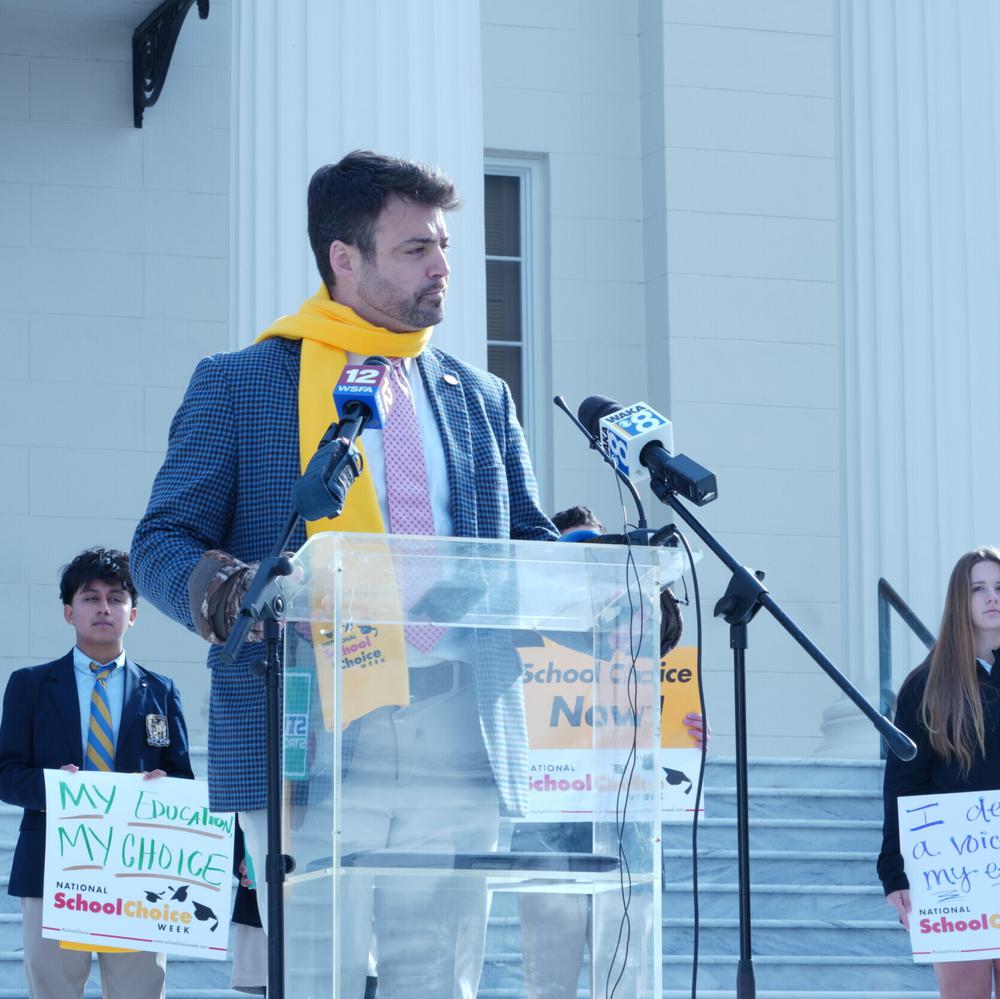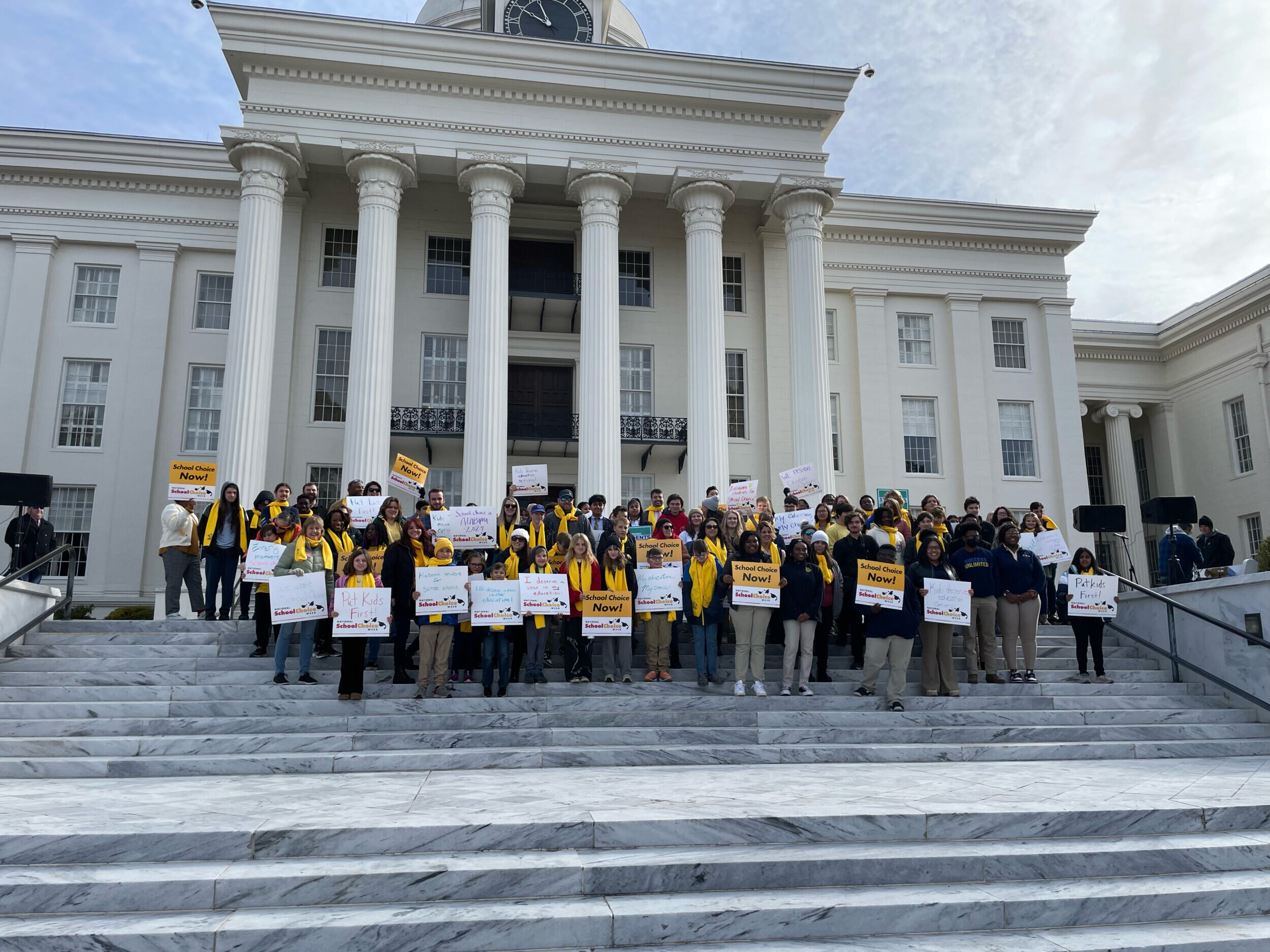MONTGOMERY — Governor Kay Ivey and former and current lawmakers braved the brisk morning temperatures with dozens of local students and parents on Monday to kick off National School Choice Week on the State Capitol steps to push more school choice ahead of the state's legislative session.
The Alabama Opportunity Scholarship Fund (AOSF) hosted the event, with executive director Andy Ryan introducing the speakers, which included Ivey, State Rep. Ernie Yarbrough (R-Trinity), parents and students speaking in support of expanded school choice.

School choice is already lined up for significant conversation during Alabama's regular legislative session, slated to kick off on February 6. While Yarbrough is the only one to announce details of an actual bill, Ivey's administration is also working on school choice legislation. Both will focus on Education Savings Accounts (ESAs).
ESAs would allocate state funds parents can access for homeschooling, private schooling and, in some cases, out-of-district schools. In many cases, ESAs are used for various necessities, such as textbooks, tuition, tutoring, language studies, therapies and extracurricular activities such as art, music, literature and more.
Ivey spoke first, opining on the importance of education in every person pursuing the American dream, saying creating ESAs was her "top priority" in the legislative session.

"I believe in the potential that lies within each of our students whether they are learning in public schools, private schools, charter schools or homeschools," Ivey said. "Providing all the children, no matter their zip code, with a solid foundation in education is critical to the future success of our state. Our mission is clear: to create an environment where every child has a chance to excel and achieve their dreams."
"This past summer, I promised to put our state at the forefront of school choice, to make Alabama the most school-friendly state in the nation, and usher in a new era of student achievement.
While giving little specifics about an ESA bill, Ivey said Alabama should "stand together" to show the nation the state's commitment to school choice by "putting parents in charge of education decisions."
"For this upcoming legislative session, my top priority is ensuring education savings accounts bill crosses the finishing line," Ivey continued. "This is key legislation that will empower Alabama students and parents, and I look forward to signing this landmark bill into law, granting parents more rights in the education of their children. It will be sustainable, responsible, and it's how we would state the future of education in Alabama. For too long, parents have been unable to make the best education decisions for their children; it's time to change that."
Several parents and students also took the podium, speaking on the benefits of having alternative forms of schooling, specifically through the AOSF, which gives funds to lower-income families to select alternative schools.
Brian Stevenson and his wife both retired from the military and settled in Montgomery. Due to Alabama's Accountability Act, which awards scholarships for students to attend non-public schools, Stevenson was able to send his children to Montgomery Christian School.
"Thanks to school choice, our family has found a perfect fit here at Montgomery Christian School," Stevenson said. "Our children [have] thrived academically, socially and spiritually in an environment that values each other's differences and fosters a culture of encouragement. School choice has given our kids the opportunity to be the best version of themselves."
Yarbrough took the stage to address what he believes are the essential elements of a "true" school choice bill. The aspects of Yarbrough's bill, which he believes are essential, will undoubtedly be at the center of the lion's share of debate surrounding school choice during the legislative session.

"Number one, it must be universal," Yarbrough said. "All students in Alabama should be immediately eligible to benefit from the program. Number two, it must be flexible. The use of [ESAs] that can be used for a wide variety of educational expenses determined by the parents. Number three, it protects the autonomy of private schools and homeschoolers because Alabama has great laws that keep government bureaucrats far away from controlling the curriculum or the testing decisions of private schools, homeschools, or any other schools when these are cherished freedoms that have been protected for us. It also provides transparency with public school curriculum because parents have the right to know what their money is paying for, and what is being taught in order to make a good decision about their child's education."
"I believe that true school choice does not increase the size and scope of government. A clean, true school choice bill will not be used as an attempt to increase government spending, government's influence on our lives as Alabamians or tie the funding mechanism for what is already the money of Alabama taxpayers to the growth of funding for government. It simply recognizes that the money that is already being gathered is actually your money," he continued.
Yarbrough said he echoed Ivey's previous statements wherein she wanted Alabama to be a national leader in school choice. He additionally pointed to his principled stand on education as a way of moving away from the Marxist model of education, which places the state at the head of education decision-making.
"Education is not the primary responsibility of the government," Yarbrough said. "That is Marxism. "It is the primary responsibility of parents. If we have woke or underperforming educational realities that [are] existing today, it's because we the people have allowed the government to become the customer of education instead of parents."
To connect with the author of this story or to comment, email craig.monger@1819news.com.
Don't miss out! Subscribe to our newsletter and get our top stories every weekday morning.










